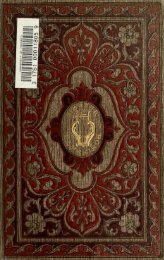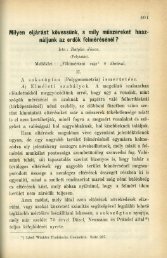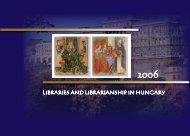THE HISTORY OF TUNGSRAM 1896-1945 - MEK
THE HISTORY OF TUNGSRAM 1896-1945 - MEK
THE HISTORY OF TUNGSRAM 1896-1945 - MEK
- No tags were found...
You also want an ePaper? Increase the reach of your titles
YUMPU automatically turns print PDFs into web optimized ePapers that Google loves.
<strong>TUNGSRAM</strong> 38Balazs, the head of the Mechanical Department. (182)The board meeting held on 28 December, 1918 gavepermission for another pay-rise, inflation adjustmentand clothing allowance. The board ordered the transferof 30,000 Koronas to the Mayor as a contribution tothe expenses of the expenses of the Ujpest "militia".(183)The shortage of coal in the first few months of 1919began to give cause for concern. In the Lamp ManufacturingDepartment, where 1683 employees were working,only 30 percent of the production capacity was•^i, utilized. Only 81,000 lamps were produced weekly,which meant that the overhead costs of 235,000Koronas had to be compared with the total sales valueof 110,000 Koronas. The Lamp Manufacturing Departmentpaid out a weekly 15,600 Koronas in benefits to179 unemployed workers. (184) The situation waseven worse in the Mechanical Department. The utilizedproduction capacity did not exceed 25 percent, so the960 employees of the Department only producedgoods worth 90,000 Koronas. This figure had to becompared with production costs of 139,000 Koronas.The Mechanical Department handed out benefits to125 unemployed people. (185) Because of the politicalintolerable international conditions, the governmentKaroiyi was no more able to hold themselves after atime and left the odium of wielding power to asocialist-communist political group. These procalimedthe Hungarian Soviet Republic modeled on Sovietpattern as a propetarian dictatorship. Until afterword itcame out, that only for a period of some month.The proclamation of the Soviet Republic broughtabout a major turn in the life of <strong>TUNGSRAM</strong> too: thecompany was nationalized. The Commissariat ofNationalized Industry put Janos Molnar in charge ofthe whole company as production commissar, MarcellAmbrus became the head of the telephone and telegraphproduction, and Laszio Havas, the head of theLamp Manufacturing Department. (186) At the sametime, the Controlling Work Council was formed. Theduty of the production commissars, as the agents ofthe Nationalized Industry Commissariat, was to keepup the work moral, guarantee the continuous productionand the best possible technical management ofthe factory. The Controlling Work Council supervisedthe activities of the production commissars. The SovietRepublic assigned great significance to the incan- *descent lamp industry Department of the NationalizedIndustry Commissariat held talks with the leaders ofthe Ujpest factory on several occasions and workedout a plan to improve the running of the LampManufacturing Department, as well as to survey thecompany's demand for raw materials and the public'sdemand forthe finished products. (187)In spite of these <strong>TUNGSRAM</strong> soon made a recovery:the Lamp Manufacturing Department was workingwith 40 percent of its capacity, the telephone andtelegraph equipment production reached 60 percent ofits capacity. Unemployment was ended, the LampManufacturing Department had 1540 workers, theMechanical Department, 1506 employees. Later therewas another great drop in production as approximately900 men were called up to do service in theHungarian Red Army. (188)During this Council Republic the nationalized company'sexpenses were covered by the nationalizedCommercial Bank. Financing posed no problems,since <strong>TUNGSRAM</strong>'S shares worth 3.7 million Koronas,10,000 Italian Lirasand 9.9 million German Marks weresufficient to serve as a guarantee. (189)During the brief existence of the Council Republic theadministration was unable to carry out the restructuringof the Ujpest factory. In spite of the difficultieshowever, it could still maintain the standard of production.i^'• > • * • ,


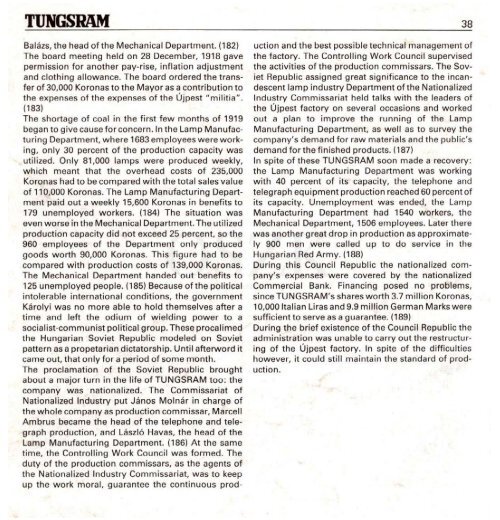



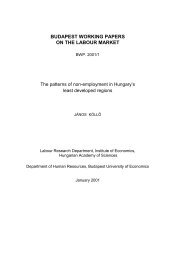

![Letöltés egy fájlban [4.3 MB - PDF]](https://img.yumpu.com/50159926/1/180x260/letaltacs-egy-fajlban-43-mb-pdf.jpg?quality=85)
